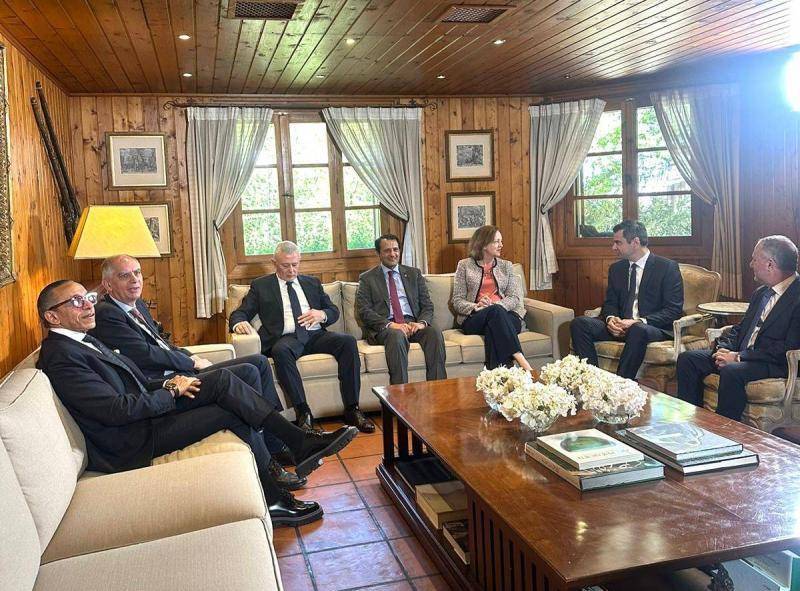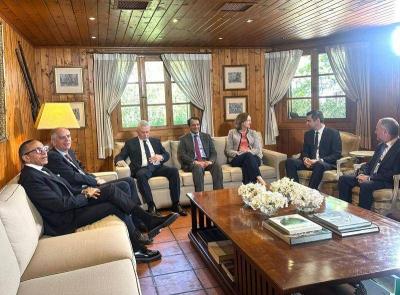The five-member committee at the ambassadorial level has broken the deadlock, and the presidential file has emerged on the Arab and international agenda, irrespective of the ongoing military operations, whether in Gaza or the southern front, as mentioned in "Al-Liwaa." Political circles clarified to "Al-Liwaa" that the meetings of the committee members with Lebanese leaders did not touch on any specific names; the discussion remains preliminary, focusing on ideas that could energize the presidential file, with the ambassadors primarily listening to the parliamentary blocs' approaches, without setting a timeframe for an agreement, which remains the foundation.
Furthermore, these circles indicated that at the conclusion of the committee's meetings, a statement or position might be released regarding the next steps and may choose one of the ambassadors to explain the situation, unless it is decided not to issue any statements before reporting the results of these meetings to the countries they represent. Therefore, it will be necessary to await the outcomes, particularly those issued by the deputies of the resistance and opposition forces.
On another front, the same sources anticipated an escalation of disputes among these forces regarding the municipal and elective elections, as the extension for municipal and elective councils is nearing completion.
The most notable station was the visit of the ambassadors to Bnachii, where they met with ambassadors: Aala Moussa (Egypt), Sheikh Saud bin Abdul Rahman bin Faisal Al Thani (Qatar), Herve Magro (France), and Lisa Johnson (United States). The Saudi ambassador, Walid Bukhari, was absent for health reasons, and Deputy Tony Franjieh and former Minister Roni Araiji attended alongside Franjieh.
What transpired in the meeting?
According to leaks, the meeting with Franjieh was not held in his capacity as a presidential candidate but rather as a Maronite political figure who experienced candidacy and received 51 votes against 59 for his competitor, former minister Jihad Azour.
Discussions focused on:
1. Franjieh's relationship with Hezbollah and whether he would be committed to the party’s agenda if elected president.
2. Franjieh's readiness to withdraw in favor of a third candidate if his chances of presidency were deemed unsuccessful, now or in the future.
3. His perspective on Lebanon's Arab status and the reforms that could be included in his presidential program.
An informed source told "Al-Liwaa" that the session resembled "an examination to Franjieh by the committee," characterized by smooth and calm exchanges; however, it did not reach a conclusive outcome that could be built upon. The ambassadors heard from Franjieh that the unity of the state, Lebanon's Arab affiliation, and openness are the primary themes of his presidential program.
Franjieh stated he is willing to cooperate and respond to any proposals, as long as they serve Lebanon's unity. He presented his presidential program to the committee and the reforms he seeks while responding to the committee's inquiry about the possibility of withdrawing in favor of a third candidate, should he fail to change the outcome of the session on June 14.
Regarding his relationship with Hezbollah, Franjieh replied that "the role of the party is national and there is no time to discuss its weapons; rather, what is needed is support against the Israeli enemy." Following this, the ambassadors visited the head of the Kataeb Party, Deputy Sami Gemayel, at the same location, where Ambassador Moussa revealed that the meeting was positive. Gemayel thanked the ambassadors from the five countries, considering that a consensus candidate does not currently exist because Hezbollah remains committed to Franjieh, who would not have persisted in his candidacy without guarantees from Hezbollah and the Amal Movement. He emphasized that what they do not accept is a high commissioner deciding on their future and the presidency.
Among the blocs visited by the ambassadors' delegation was the "National Moderation Bloc," where discussions were held on possible approaches to achieve the entitlements. Deputy Walid al-Baarini clarified: "We now have more clarity on how to unify efforts and limit divergence to the party that will call for consultation and chair the consultative session."
The ambassadors of the "five" will visit the head of the Free Patriotic Movement, Deputy Jibran Bassil, at his home in Bayyada today at eleven in the morning, also in a political capacity according to "Al-Liwaa."




